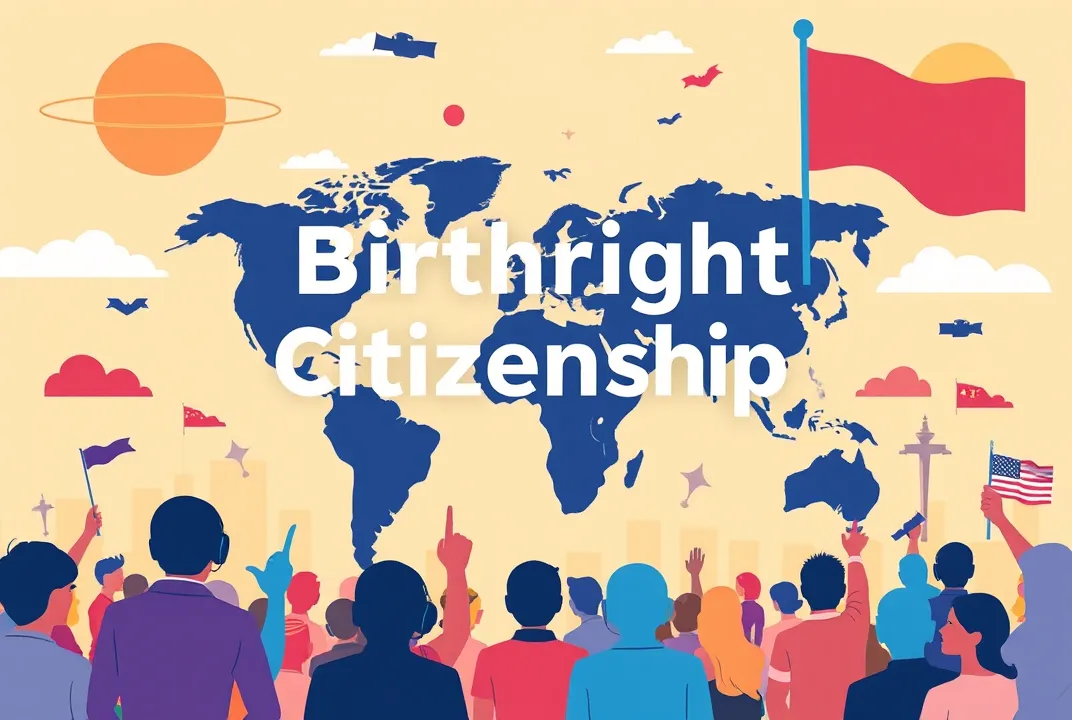Introduction: The Story of Birthright Citizenship
In a world where borders can often feel like barriers, the concept of birthright citizenship stands as a beacon of hope and a subject of heated debate. Imagine a baby born on a bustling city street, cradled in the arms of a migrant mother seeking a better life, unaware that their very first breath would tie them to the complex tapestry of citizenship rights. This narrative is not just a personal story; it's emblematic of a larger phenomenon that impacts millions across the globe.
Birthright citizenship, which grants citizenship based on the location of one’s birth, is at the heart of many contemporary discussions surrounding immigration, identity, and national belonging. As more countries reassess their immigration policies and societal values, the implications of birthright citizenship are unfolding in ways that shape modern societies.
Understanding Birthright Citizenship
What Is Birthright Citizenship?
Birthright citizenship, also known as jus soli (right of the soil), allows individuals born within a country's borders to automatically acquire that nation's citizenship. This principle is enshrined in law in just a handful of countries, with the United States and Canada being the most notable examples.
In many nations, the citizenship process is more complex, requiring the parents to have legal residency or citizenship status for their children to inherit their nationality. This difference sparks debates about fairness, rights, and the future of global migration.
Global Perspectives on Birthright Citizenship
Around the world, the acceptance of birthright citizenship varies significantly. In countries like Japan and Germany, citizenship is primarily determined by bloodline (jus sanguinis). This approach emphasizes heritage over birthplace, raising questions about multiculturalism and national identity.
Conversely, the U.S. remains one of the few countries that uphold the principle of jus soli. However, this practice is under scrutiny, with policymakers and citizens debating whether it should continue in an age of heightened nationalism and immigration scrutiny.
Recent Developments and Their Impact
Political Climate and Legislative Changes
In recent months, several nations have proposed or enacted changes to their birthright citizenship laws. Notably, political movements in the U.S. have reignited discussions about the 14th Amendment, which grants citizenship to anyone born on U.S. soil.
In 2023, a wave of state-level proposals aimed at limiting birthright citizenship emerged, focusing on the perceived strain that undocumented immigration places on public resources. Proponents argue that these changes are necessary to protect national integrity, while opponents warn of the potential human rights violations impacting countless children.
Case Studies: Personal Stories
The narrative of birthright citizenship is not just abstract legal jargon; it is grounded in the lived experiences of countless individuals. Take, for instance, the story of Maria, a child born in the United States to undocumented immigrants. Maria's birthright citizenship meant she was recognized as a full citizen, granting her access to education and healthcare that her parents, living in fear of deportation, could not secure.
Conversely, consider the plight of families in countries like the U.K., where restrictive citizenship laws have left children born to non-citizen parents in a limbo. For those children, the absence of birthright citizenship often results in barriers to education and social services, perpetuating cycles of poverty and exclusion.
The Emotional and Social Dimensions
The Role of Identity
Birthright citizenship plays a crucial role in shaping individual and national identity. For individuals like Maria, citizenship is not merely a legal status; it is a source of belonging and security. The sense of pride in being a citizen can empower youths to engage civically and strive for their dreams.
However, the denial of citizenship can lead to deep-rooted feelings of alienation and marginalization. Children who grow up without citizenship often struggle with questions of identity, grappling with dual heritages and the stark realities of their legal status.
Community Responses
Communities across the globe are reacting to these developments with resilience and activism. Grassroots movements advocating for the rights of undocumented families are gaining momentum, highlighting the importance of preserving birthright citizenship in an increasingly polarized political landscape.
Organizations are springing up to support families, providing legal aid and resources to navigate the complex immigration system. The voices of those directly affected are becoming louder, weaving a narrative that emphasizes the human cost of restrictive policies.
Conclusion: The Future of Birthright Citizenship
As societies evolve and grapple with the implications of globalization and migration, the future of birthright citizenship remains uncertain. The stories of individuals, like Maria, serve as poignant reminders of the importance of inclusivity and compassion in our legal systems.
In an era marked by division, the conversation surrounding birthright citizenship invites us to reflect on our shared humanity and the values we uphold as nations. As we explore the implications of these policies, it is essential to consider not just the legal ramifications but the emotional and social dimensions that shape the lives of so many.
Ultimately, the journey of understanding birthright citizenship is about more than just laws; it is about recognizing the intrinsic dignity of every individual and fostering a society where everyone has the opportunity to thrive. As we continue to navigate this complex landscape, let us strive for a future that honors both our differences and commonalities, ensuring that every child, regardless of their birthplace, feels at home in the world.

